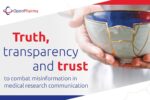This week, we look forward to the STM Research Integrity Day and celebrate the launch of Current Medical Research and Opinion’s Putting patients first article collection. We signpost an upcoming webinar from the SPARC Europe European Rights Retention Community of Practice and we read the latest guidance from COPE on robust funding declarations. We also explore OASPA’s new position paper outlining its continued mission to achieve 100% open access publishing, and we learn that AIP Publishing is ending its S2O pilot. Finally, we review two research articles, one assessing the use of AI to reduce bias in the selection of peer-reviewers and another assessing the impact of open access publishing on citation counts and altmetrics.
To engage with:
STM Research Integrity Day via STM
Join Research Integrity Day, the second of the 2025 Innovation & Integrity Days, from the International Association of Scientific, Technical & Medical Publishers (STM) on Wednesday 10 December 2025 at BMA House, London, UK. The event will dive into evolving threats to research integrity, showcase innovative detection tools and highlight recent developments from the STM Integrity Hub. Registration is open now and is ideal for research integrity managers, publishers and ethics specialists who are eager to shape the future of transparent and trustworthy research.
Putting patients first: an article collection via Current Medical Research and Opinion
Taylor & Francis journal Current Medical Research and Opinion has curated an article collection to capture the patient voice in publications and research. The collection, titled Putting patients first through patient‑reported outcomes and patient engagement research, comprises 23 multidisciplinary papers to showcase how patient and caregiver voices shape clinical research and decision‑making.
Rights Retention Community of Practice via SPARC Europe
The European Rights Retention Community of Practice will hold its seventh meeting this November, continuing its mission to share experiences and strengthen open science practices across Europe. The session will feature speakers from Slovenia, where a legal rights retention obligation is now bolstered by Secondary Publishing Rights, and Sweden, which recently published a national report on achieving 100% open access. Registration is free and open now.
To read:
COPE issues guidance on robust funding declarations via COPE | 2-minute read
The Committee on Publication Ethics (COPE) has released a discussion document with a framework to improve the transparency of research funding declarations. This guidance recommends that statements include the funding organization name and identifier (e.g. Research Organization Registry ID), the names of the authors linked to the funding agency, and a description of the link between the funder and the publication. Journals are urged to include explicit instructions for funding declarations in submission guidelines. If journal formats do not align with funders’ requirements, COPE advises authors and editors to negotiate or reconsider publication options.
OASPA’s new position paper via OASPA | 20-minute read
To mark the end of the year-long Next 50% project, the Open Access Scholarly Publishing Association (OASPA) has published a new position paper, Embracing the complexity of 100% OA: from percentage to participation. Through varied stakeholder engagement, OASPA has identified five priority ‘unsolved problems’ in open access: inequitable publishing models, limited availability of sustainable funding, excessive focus on research articles, commodification of research outputs and a need for more coordinated action. The position paper concludes by pledging short-, medium- and long-term goals to advance equitable open access participation.
AIP Publishing ends S2O pilot via AIP Publishing | 4-minute read
AIP Publishing has announced the conclusion of its Subscribe to Open (S2O) pilot, which was launched in 2023 to explore sustainable open access business models. Despite strong community engagement, the pilot revealed challenges in achieving long-term financial stability and scalability. AIP Publishing will now focus on expanding transformative agreements, enhancing gold open access options and developing new publishing models, such as AIP Fusion.
AI boosts diversity in peer review if prompts include DEI via Research Integrity and Peer Review | 20-minute read
Artificial intelligence (AI) model GPT‑4o could combat gender and geographical gaps in peer review, but only if specifically prompted to consider diversity, equity and inclusion (DEI). This study analysed AI-generated lists of potential peer reviewers (“distinguished scientists”) developed from the titles and abstracts of 50 published articles. Lists were generated twice for each article – once with a gender and geographical DEI prompt, and once without. Prompts that included DEI led to lists of potential reviewers with higher female representation (51% versus 32% in non-DEI lists) and a broader geographical inclusion across middle- and lower-income regions. Crucially, academic productivity and citation metrics remained comparable between the DEI and the non-DEI groups. These findings highlight AI’s potential to advance equity in peer review when guided by inclusive prompts.
Open access boosts academic citations and societal engagement via Scientometrics | 10-minute read
This bibliometric and altmetric analysis of Israeli-authored publications (2013–2023) examined how open access – specifically, gold, hybrid, green and bronze models – compared with closed access in terms of article citations and public engagement. Bronze OA demonstrated the strongest combination of academic impact and altmetric attention, with hybrid models performing similarly. Although closed access yielded the highest usage metrics, open access articles consistently outperformed articles behind paywalls in terms of citations and online visibility.
Enjoy our content? Read last week’s digest and check out our latest quarterly update!
Don’t forget to follow us on Bluesky and LinkedIn for regular updates!






